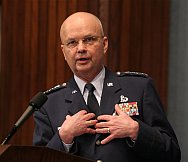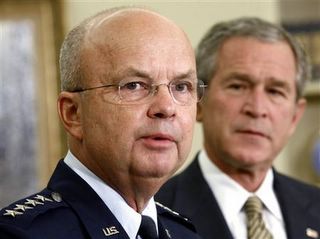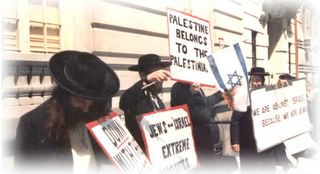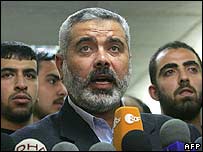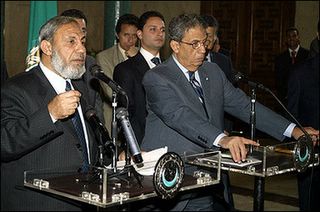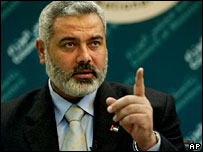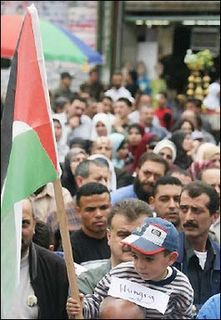
The Lineage of Muhammad (PBUH)

[I do apologize, that for me to post the lineage above that it doesn't show the actual size of the diagram. Also, the names here are in Arabic not English.]
Introductionby
Housewife4PalestineTo give you another idea of who Muhammad (PBUH) was, I thought you would like to see his lineage and that he was not a man to be insulted nor like any Prophet that Allah has ever sent before. That he was not just an extraordinary prophet but a very great human being.
In Islam and I would hope any religion on this earth, that we wouldn’t blatantly insult anything to do with anyone’s religion especially in Christianity, Judaism or Islam do to the fact our religions are related.
Below is the common history which has never been disputed by any theologian or scholar.Life of Muhammad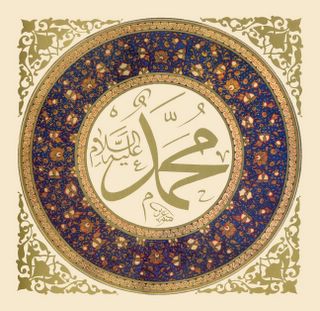
"Muhammad" in Arabic Calligraphy
 Common HistoryMuhammad
Common HistoryMuhammad (Arabic: محمد also Mohammed and other variants) (c. 570–632) is a major figure in Islam. Muslims believe he was God's final prophet, to whom the Qur'an was revealed. Non-Muslims consider him to be the founder of Islam.
According to traditional Muslim biographers, Muhammad was born (c. 570 in Mecca) and died (June 8, 632 in Medina) in the Hejaz region of present day Saudi Arabia.
The name Muhammad means "the praised one" in Arabic, being a passive participle from the root hmd حمد "to praise". Within Islam, Muhammad is known as "The Prophet" and "The Messenger". The Qur'an (33:40) also refers to him as the "Seal of the Prophets" (Arabic: khatam an-nabiyyīn).
SummaryBorn Muhammad ibn `Abdu'llah ibn `Abdu'l-Muttalib, he is said to have initially been a merchant who traveled widely. Muhammad often retreated to the mountains outside Mecca, for prayer and contemplation. Muslims believe that in 610, at about the age of forty, while praying in one of these mountain caves called Hira, he was visited by the Angel Gabriel, who commanded him to memorize and recite the verses sent by God. These verses were later collected as part of the Qur'an.
He expanded his mission as a prophet, publicly preaching strict monotheism and warning of a Day of Judgment when all humans shall be held responsible for their deeds. He did not completely reject Judaism and Christianity, two other monotheistic faiths known to the Arabs, but said that he had been sent by God in order to complete and perfect those teachings.
Many in Mecca resented his preaching and persecuted him and his followers. Eventually, in 622, he was forced to flee from Mecca in a journey known to Muslims as the Hijra (The Migration). He settled in Yathrib (now known as Medina) with his followers, where he was the leader of the first avowedly Muslim community.
War between factions in Mecca and Medina followed, in which Muhammad and his followers were victorious. They had in great part achieved their victory by building a tribal coalition. After the conquest of Mecca, the coalition was extended. By the time of Muhammad's death, he had unified much of Arabia under his rule, and launched military expeditions to the north, towards Syria and Palestine.
Under Muhammad's immediate successors, the Islamic empire expanded into Palestine, Syria, Mesopotamia, Persia, Egypt, North Africa, and Iberia. Later conquests, commercial contact between Muslims and non-Muslims, and missionary activity spread Islam over much of the Eastern Hemisphere.
SourcesMost biographical sources of Muhammad were written by Muslims and were recorded in writing centuries after his death. There are no references in non-Muslim historical records from the 7th century, and no inscriptions or archaeological remains from that time.
The dates often given for Muhammad's life are 570-632 CE. The earliest biography known is the Life of the Apostle of God, by Ibn Ishaq who was born about 717 and died in 767. He thus wrote his biography well over 100 years after Mohammed died. He would not have been able to speak to any eyewitnesses, only to those who had heard their accounts, or accounts of their accounts. Furthermore, we possess Ibn Ishaq's work only in fragments quoted in a compilation of anecdotes and traditions composed by Islamic historian Ibn Hisham(???-834) and al-Tabari (838-923). Other sources for biographies of Muhammad are: the military chronicles of Waqidi (745-822), the biographies of Ibn Sa'd (783-845), a student of Waqidi, later histories, Quranic commentaries, and the collections of oral traditions known as hadith. These texts were recorded more than a century, and often several centuries, after the death of Muhammad. There are some passages in the Qur'an that are believed to shed some light on Muhammad's biography, however, they require a great deal of interpretation to be useful.
Some skeptical scholars (
Wansbrough, Cook,
Crone, and others) have raised doubts about the reliability of the Islamic sources, especially the hadith collections. They believe that many hadith, and other traditions, were manufactured, or doctored, to support one or another of the many political or doctrinal factions that had developed within Islam in its first century or later. The life of Muhammad was believed to be the exemplar for all Muslims; hence the importance of showing that Muhammad said or did something proving that a particular faction was right. If the sceptics are right, and much of the early material cannot really be trusted, then all that is factually known is what is contained in the summary above.
Other academic scholars, such as
Montgomery Watt and
Wilferd Madelung, have been much more willing to trust the Islamic sources. Their accounts of the life of Muhammad are similar to those held by most believing Muslims. These theological "traditionalists," both Muslim and non-Muslim, paint a much more detailed picture of Muhammad's life.
There is a great deal of possibly unreliable material for a life of Muhammad and very little that is accepted by all non-Muslim academics. Gregor Schoeler summarizes it, in a 2003 article:
"The current research on the life of Muhammad is characterized by the fact that two groups of researchers stand directly opposed to one another: The one group advocates, somewhat aggressively, the conviction that all transmitted traditions, in part because of great inner contradictions, legendary forms, and so forth, are to be rejected. The other group is opposed to that view. According to these researchers, the Islamic transmission, despite all these defects, has at least a genuine core, which can be recognized using the appropriate source-critical methods. The difficulty certainly consists of finding criteria by which the genuine is to be differentiated from spurious."
Many (but not all) of the first group of scholars would probably accept the summary given above. The second group of academics is more willing to accept the traditional Muslim accounts, shorn of hagiography and supernatural claims and based on the earliest accounts rather than later traditions. This version of the biography follows.
Many Muslims accept even fuller accounts of Muhammad's life. They believe traditions not credited by non-Muslim scholars. However, Muslims are not of one mind on the subject. Some Muslims accept "naturalistic" versions pared of most supernatural elements; some Muslims believe in versions of Muhammad's life full of miracles. There are versions of Muhammad's life favoring different traditions within Islam. A
Sunni version of Muhammad's life is very different from a
Shi'a version. It is impossible to present one Muslim version. However, a few of the commonest traditions, ones that are not accepted by academics but widely believed by Muslims, are covered in a final section.
His life according to selected Islamic traditionsThis account would be accepted by the traditionalist academics, like Watt, and also by most Muslims.GenealogyAccording to tradition, Muhammad traced his genealogy back as far as Adnan, whom the northern Arabs believed to be their common ancestor. Adnan in turn is said to be a descendant of Ismaeel (Ishmael), son of Ibrahim (Abraham) though the exact genealogy is disputed. Muhammad's genealogy up to Adnan is as follows:
Muhammad ibn Abd Allah ibn Abd al-Muttalib (Shaiba) ibn Hashim (Amr) ibn Abd Manaf (al-Mughira) ibn Qusai (Zaid) ibn Kilab ibn Murra ibn Ka`b ibn Lu'ay ibn Ghalib ibn Fahr (Quraish) ibn Malik ibn an-Nadr (Qais) ibn Kinana ibn Khuzaimah ibn Mudrikah (Amir) ibn Ilyas ibn Mudar ibn Nizar ibn Ma`ad ibn Adnan. (ibn means "son of" in Arabic; alternate names of people with two names are given in parentheses.)
He was also called Abul-Qaasim by some meaning "father of Qaasim", after his short-lived first son.
ChildhoodMuhammad was born into a well-to-do family settled in the northern Arabian town of Mecca. Some calculate his birthdate as 20 April 570, while Shi'a Muslims believe it to be 26 April 570, and the Book of Days by Robert Chambers points to 10 November 570. Other sources calculate the year of his birth to be 571; tradition places it in the Year of the Elephant. Muhammad's father, Abdullah, had died almost six months before he was born and the young boy was brought up by his paternal grandfather Abd al-Muttalib, of the Banu Hashim clan of the Quraish tribe. At the age of six, Muhammad lost his mother Amina and at the age of eight his grandfather Abd al-Muttalib, who had become his guardian, also died. Muhammad now came under the care of his uncle Abu Talib, the new leader of the Hashim clan of the Quraish tribe, the most powerful in Mecca.
Mecca was a thriving commercial centre, due in great part to a stone temple (now called the Kaaba) that housed many different idols. Merchants from different tribes would visit Mecca during the pilgrimage season, when all inter-tribal warfare was forbidden and they could trade in safety. While still in his teens, Muhammad began accompanying his uncle on trading journeys to Syria. He thus became well-travelled and knowledgeable as to foreign ways.
Middle yearsMuhammad became a merchant and one of his employers was Khadijah, a widow who is said to have been forty years old. The young twenty-five-year old Muhammad had impressed Khadijah, and she proposed to him in the year 595.
Ibn Ishaq records that Khadijah bore Muhammad five children: one son and four daughters. All of Khadija's children were born before Muhammad received his first revelation. His son Qasim died at the age of two. The four daughters are said to be Zainab, Ruqayyah, Umm Kulthum, and Fatima.
The Shi'a say that Muhammad had only the one daughter, Fatima, and that the other daughters were either children of Khadijah by her previous marriage, or children of her sister.
The first revelationsMuhammad had a reflective turn of mind and routinely spent nights in a cave (Hira) near Mecca in meditation and thought. Muslims believe that around the year 610, while meditating, Muhammad was visited by the Angel Gabriel.
His wife Khadijah and her Christian cousin Waraqah ibn Nawfal were the first to believe Muhammad was a prophet. She was soon followed by his ten-year-old cousin Ali ibn Abi Talib, Abu Bakr, one of Muhammad's close friends and Zaid bin Haarith, his adopted son.
Until his death, Muhammad reportedly received frequent revelations, although there was a relatively long gap after the first revelation. This silence worried him, until he received surat , whose words provided comfort and reassurance.
Around 613, Muhammad began to spread his message amongst the people. Most of those who heard his message ignored it. A few mocked him. Others, believed and joined him.
RejectionAs the ranks of Muhammad's followers swelled, he became a threat to the local tribes and the rulers of the city. Their wealth, after all, rested on the Kaaba, a sacred house of idols and the focal point of Meccan religious life. If they threw out their idols, as Muhammad preached, there would be no more pilgrims, no more trade, and no more wealth. Muhammad’s denunciation of the Meccan traditional religion was especially offensive to his own tribe, the Quraysh, as they were the guardians of the Ka'aba. Muhammad and his followers were persecuted. Some of them fled to the Ethiopian Kingdom of Aksum and founded a small colony (called Negash, or "King") there under the protection of the Ethiopian king. The Quraysh attempted to persuade the king to expel the Muslims on grounds that their faith was contadictory to his Christian following. The Muslims were allowed to stay when they demonstrated that the Qur'an paid great respect to Jesus and Mary.
Several suras and parts of suras are said to date from this time, and reflect its circumstances: see for example al-Masadd, al-Humaza, parts of Maryam and al-Anbiya, al-Kafirun, and Abasa.
In 619, both Muhammad's wife Khadijah and his uncle Abu Talib died; it was known as aamul hazn ("the year of sorrows.") Muhammad's own clan withdrew their protection of him. Muslims patiently endured hunger and persecution.
Isra and MirajSome time in 620, Muhammad told his followers that he had experienced the Isra and Miraj, a miraculous journey said to have been accomplished in one night along with Angel Gabriel. In the first part of the journey, the Isra, he is said to have travelled from Mecca to the furthest mosque. In the second part, the Miraj, Muhammad is said to have toured Heaven and Hell, and spoken with earlier prophets, such as Abraham, Moses, and Jesus.
Muslims believe that the Jerusalem mosque on the Temple Mount known as the Masjid al-Aqsa or furthest mosque, is the site from which Muhammad ascended to Heaven.
HijraBy 622, life in the small Muslim community of Mecca was becoming not only difficult, but dangerous. Muslim traditions say that there were several attempts to assassinate Muhammad. Muhammad then resolved to emigrate to Medina, then known as Yathrib, a large agricultural oasis where there were a number of Muslim converts. By breaking the link with his own tribe, Muhammad demonstrated that tribal and family loyalties were insignificant compared to the bonds of Islam, a revolutionary idea in the tribal society of Arabia. This Hijra or emigration (traditionally translated into English as "flight") marks the beginning of the Islamic calendar. The Muslim calendar counts dates from the Hijra, which is why Muslim dates have the suffix AH (After Hijra).
Muhammad came to Medina as a mediator, invited to resolve the feud between the Arab factions of Aws and Khazraj. He ultimately did so by absorbing both factions into his Muslim community, forbidding bloodshed among Muslims. However, Medina was also home to a number of Jewish tribes (whether they were ethnically as well as religiously Jewish is an open question, as is the depth of their "Jewishness"). Islamic tradition refers to the conversion to Islam of one of the leaders of the Jews named Ibn Salam. Muhammad had hoped that his conversion would be followed and that other Jews would also recognize him as a prophet, but they did not do so. The Quran refers to this:
"Is it not a sign to them that the learned scholars of the Children of Israel knew it as true?" (Chapter 26 verse 197)
Some academic historians, arbitrarly attribute the change of qibla, the Muslim direction of prayer, from the site of the former Temple in Jerusalem to the Kaaba in Mecca, which occurred during this period, to Muhammad's abandonment of hope of recruiting Jews as allies or followers. According to Muslims, the change of qibla was seen as a command from Allah both reflecting the independence of the Muslims as well as a test to discern those who truly followed the revelation and those who were simply opportunistic. The Quran refers to this in the following verses:
"Thus we have made you [Muslims] a just nation that you be witnesses over mankind and the messenger be a witness over you. And We made the Qiblah which you used to face (Jerusalem), only to test those who would followed the Messenger from those who would turn on their heels (i.e turn away in disobedience when the direction would be changed)(Chapter 2 vs 143).
Muhammad and his followers are said to have negotiated an agreement with the other Medinans, a document now known as the Constitution of Medina (date debated), which laid out the terms on which the different factions, specifically the Jews and other "Peoples of the Book" could exist within the new Islamic State. This system would come to typify Muslim relations with their non-believing subjects.
WarRelations between Mecca and Medina rapidly worsened (see surat al-Baqara). Meccans confiscated all the property that the Muslims had left in Mecca. In Medina, Muhammad signed treaties of alliance and mutual help with neighboring tribes.
Muhammad turned to raiding caravans bound for Mecca. Caravan raiding (al-ghazw) was an old Arabian tradition; Muslims justified the raids by the Meccans' confiscation of the property they had left at Mecca and the state of war deemed to exist between the Meccans and the Muslims. Secular scholars add this was also a matter of survival for the Muslims. They owned no land in Medina and if they did not raid, they would have to live on charity and whatever wage labor they could find, both of which were in short supply in the small oasis.
In March of 624, Muhammad led some 300 warriors in a raid on a Meccan merchant caravan. The Meccans successfully defended the caravan and then decided to teach the Medinans a lesson. They sent a small army against Medina. On March 15, 624 near a place called Badr, the Meccans and the Muslims clashed. Though outnumbered more than 3 times (1000 to 300) in the battle, the Muslims met with success, killing at least forty-five Meccans and taking seventy prisoners for ransom; only fourteen Muslims died. This marked the real beginning of Muslim military achievement.
Rule consolidatedTo his followers, the victory in Badr appeared as a divine authentication of Muhammad's prophethood. Following this victory, the victors expelled a local Jewish clan, the Banu Qainuqa, whom they believed to have broken a treaty by conspiring with the attacking Meccan forces. Muhammad and his followers were now a dominant force in the oasis.
After Khadija's death, Muhammad married again, to Aisha, the daughter of his friend Abu Bakr (who would later emerge as the first leader of the Muslims after Muhammad's death). In Medina, he married Hafsah, daughter of Umar (who would eventually become Abu Bakr's successor).
Muhammad's daughter Fatima married Ali, Muhammad's cousin. According to the Sunni, another daughter, Umm Kulthum, married Uthman. Each of these men, in later years, would emerge as successors to Muhammad and political leaders of the Muslims. Thus, all four of the first four caliphs were linked to Muhammad by marriage. Sunni Muslims regard these caliphs as the Rashidun, or Rightly Guided. (See Succession to Muhammad for more information on the controversy on the succession to the caliphate).
Continued warfareIn 625 the Meccan general Abu Sufyan marched on Medina with 3,000 men. The ensuing Battle of Uhud took place on March 23, ending in a stalemate. The Meccans claimed victory, but they had lost too many men to pursue the Muslims into Medina.
In April 627 Abu Sufyan led another strong force against Medina. But Muhammad had dug a trench around Medina and successfully defended the city in the Battle of the Trench.
Many of the Muslims believed that Abu Sufyan had been aided by sympathizers among the Medinans, the Jewish tribe of the Banu Qurayza.
Following the Muslim's victory at the Battle of the Trench, the Muslims were able, through conversion and conquest, to extend their rule to many of the neighboring cities and tribes.
The conquest of MeccaBy 628, the Muslim position was strong enough that Muhammad decided to return to Mecca, this time as a pilgrim. In March of that year, he set out for Mecca, followed by 1,600 men. After some negotiation, a treaty was signed at the border town of al-Hudaybiyah. While Muhammad would not be allowed to finish his pilgrimage that year, hostilities would cease and the Muslims would have permission to make a pilgrimage to Mecca in the following year.
The agreement lasted only two years, however. Tribal allies of the Muslims and the Meccans clashed. The Muslims regarded this as a breach of the treaty. In 630, Muhammad marched on Mecca with an enormous force, said to number more than 10,000 men. The Meccans submitted without a fight, and thus, there was no bloodshed. Muhammad promised a general amnesty to all but a few of the Meccans. Most Meccans converted to Islam, and Muhammad destroyed the idols in the Kaaba. Henceforth the pilgrimage would be a Muslim pilgrimage and the shrine a Muslim shrine.
Unification of ArabiaThe capitulation of Mecca and the defeat of an alliance of enemy tribes at Hunayn effectively brought the greater part of the Arabian peninsula under Muhammad's authority. This authority was not enforced by a regular government, however, as he chose instead to rule through personal relationships and tribal treaties. The Muslims were clearly the dominant force in Arabia, and most of the remaining tribes and states hastened to convert to Islam.
Muhammad as a warriorFor most of the sixty-three years of his life, Muhammad was a merchant, then a prophet. He took up the sword late in his life. He was a warrior for ten years.
Critics claim that Muhammad expanded his realm and imposed his religion by force. Muslim commentators, however, argue that he fought only to defend his community against the Meccans, and that he insisted on humane rules of warfare. This is further discussed in the main article.
Family lifeFrom 595 to 619, Muhammad had only one wife, Khadijah, who may have been fifteen years older than he was. After her death he married Aisha, then Hafsa. Later he was to marry more wives, for a total of eleven (nine or ten living at the time of his death). (The status of Maria al-Qibtiyya is much disputed; she may have been a slave, a freed slave, or a wife.)
Khadijah was Muhammad's first wife and the mother of the only child to survive him, his daughter Fatima. He married his other wives after the death of Khadijah. One of the later unions resulted in a son, but the child died when he was ten months old.
Muhammad's marriages have been the subject of much criticism. Some consider it unfair that he took more wives than his followers (Qur'an 33:50) and they question the circumstances of some of his marriages, such as his marriage to his adopted son's ex-wife, and his marriage to Aisha, who may have been nine (as reported in some collected traditions, or hadith). Muslims argue that many of his marriages were political, made to cement ties with close friends and tribal leaders, or charitable in nature, protecting Muslim women widowed in war. See the main article for further discussion. However, from Hadith resources, it may come clear that
Aisha was between 17-19 when Muhammad married her, the confusion about her old when marriage is due unreliable or mistransfered resources.
CompanionsThe term Sahaba (companion) refers to anyone who met three criteria. First, he must have been a contemporary of Muhammad. Second, he must have seen or heard Muhammad speak on at least one occasion. Third, he must have converted to Islam. Companions are considered the ultimate sources for the oral traditions, or hadith, on which much Muslim law and practice are based. There were many other companions in addition to the ones listed here.
List in alphabetic order:Abdullah ibn Abbas Abu Bakr Abu Dharr Ali ibn Abi Talib Ammar Bilal Hamza Al-Miqdad Sa'd Zayd Salman the Persian Talha Umar Uthman Zubair DeathOne day upon returning from a visit to a cemetery Muhammad became very ill. He suffered for several days with head pain and weakness. Muhammad finally succumbed to his malady around noon on Monday June 8, 632, in the city of Medina at the age of sixty-three.
According to Shi'a Islam, Muhammad had appointed his son-in-law Ali as his successor, in a public sermon at Ghadir Khumm. Shi'a believe that Muhammad's companions Abu Bakr and Umar conspired to oust Ali and make Abu Bakr the leader or caliph. Sunni Muslims dispute this, and say that the leaders of the community conferred and freely chose Abu Bakr, who was pre-eminent among the followers of Muhammad. The matter is further discussed in the article Succession to Muhammad.
Abu Bakr spent much of his short reign suppressing rebellious tribes in the Ridda Wars. With unity restored in Arabia, the Muslims looked outward and commenced the conquests that would eventually unite the Middle East under the caliphs.
DescendantsMuhammad was survived by his daughter Fatima and her children. (Some say that he had a daughter Zainab, who had borne a daughter, Amma or Umama, who survived him as well.)
In Shi'a Islam, it is believed that Fatima's husband Ali and his descendants are the rightful leaders of the faithful. The Sunni do not accept this view, but they still honor Muhammad's descendants.
Descendants of Muhammad are known by many names, such as sayyids, syeds سيد, and sharifs شريف (plural: ِأشراف Ashraaf). Many rulers and notables in Muslim countries, past and present, claim such descent, with various degrees of credibility, such as the Fatimid dynasty of North Africa, the Idrisids, the current royal families of Jordan and Morocco, and the Agha Khan Imams of the Ismaili branch of Islam. In various Muslim countries, there are societies that authenticate claims of descent; some societies are more credible than others.
Link:This is Mohammad





